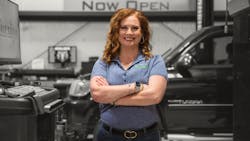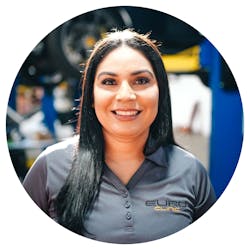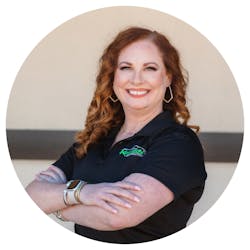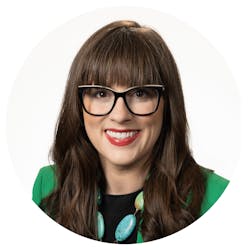When Congress declared war on Imperial Japan and sent the Yanks into combat in 1941, women across the United States traded in their heels for work boots. Uniting under the empowering spirit of Rosie the Riveter, women flocked in droves into the industrial labor force filling jobs left by their brothers, sons and husbands.
Today in the automotive aftermarket, that enterprising spirit—“We Can Do It”—lives on in the women who call this industry home. Not only are women turning wrenches, but their executive prowess is also turning heads. According to the Ratchet+Wrench Industry Survey Report, sponsored by AutoZone and Mobil 1, approximately 10% of the auto care industry is female. While their number seems small, their influence is growing.
Now, you’ll meet four women in the industry who recount what the automotive aftermarket means to them and how they’re leaving their mark in ways reminiscent of the women who came before them.
Michelle Tansey: "We're Long-Term Visionaries"
“It’s cool to them because I'm Hispanic, I'm female and I'm young,” laughs Tansey.
She didn’t intend to become a shop owner. That was Bernard’s game. She was happy in law enforcement, but one day persuaded Bernard, a 20-plus-year auto industry veteran who was then working as a foreman at a Volkswagen dealership, to open his own shop. Bernard had grown frustrated with the dealership’s revolving door of managers. So, he listened. After running the shop as a side hustle, Bernard’s weekend income began to eclipse his paychecks. That’s when it got real.
Tansey cashed out her pension and Bernard his 401(k) to get startup capital, and she filed paperwork for incorporation. She recalls the early days of her husband doing all the shop jobs—porter, service advisor, parts—and bringing in $13,000 per month. Today, the shop rakes in $2 million annually, and Tansey is the majority owner with a 51% stake. EuroClinic operates from a $250,000 building, and Tansey says she still laughs when remembering how much their hands trembled when they stroked a $20,000 check to get into their first shop.
Education Leads to Elevation
Tansey says her formal education—something her mother was adamant about—coupled with her law enforcement background is foundational in her business’s success. She holds a bachelor’s degree in administration of justice from San Jose State University along with five minors. In the shop, she manages the front of the house and says her experience as a police officer taught her that leadership isn’t a title or a role to aspire to, but a state of mind. And coming from one predominantly male industry into another, she understands how to work with men.
“It's about coaching them to work through their weaknesses and help sell the big vision. I consider myself a visionary type of leader,” Tansey says.
Being Californian, Tansey leans into the progressive spirit of the state and she takes pride in her forward-thinking leadership. One of her focuses is elevating the profile of women in the industry, starting with those in her shop.
“Our manager is female, and she's the one that runs the whole joint, and I would love to have a female tech someday,” Tansey says, adding that female techs aren’t met with enthusiasm, even in California.
Through her local chamber of commerce, where she sits on the board of educational groups, Tansey aims to embody the age-old quote, “Be the change you want to see in the world.”
“(The chamber of commerce) thinks it's great that I'm setting an example for future generations. It's a big deal. I take that with great pride. It’s a big responsibility to lead by example,” Tansey says.
Managing by KPI and Connecting with People
Women are astute managers of data when it comes to shop management. As indicated by the findings of the 2023 Ratchet+Wrench Survey Report, women thrive on tracking KPI and using it to improve the efficiency within their shops.
“I think we're just driven by data; stuff needs to make sense,” Tansey says. “It’s easier for us to catch on and implement (data) in our day-to-day operations with our staff and share the vision with them. Data is what's going to drive us to our next goal.”
Tansey says whereas men are more connected to shop efficiency, women see the data as a metric for holistic improvements across the shop. That keen eye for data came in handy when she noticed the shop plateauing and explored the idea of getting a coach involved. When she brought the idea of having outside help in the business, Bernard balked but eventually relented through Tansey’s persistence and coaching became the shot in the arm the shop needed.
“He didn't understand why I thought we needed it,” Tansey says. “He said, ‘We're going to send out money to have friends.’ I (told him) that's not what we're doing here. I said, we’ve plateaued, and it's going to take longer for me to figure it out by myself unless we get coaching.”
Six years ago, Tansey started networking in the industry, eventually aligning herself with Women in Auto Care. Today, she leads a female round table with two other shop owners. And even though she feels the presence of women is lacking at many industry events, it's something she wants to change through those training meetings held online every third Thursday of the month.
“We focus solely on growing leadership skills, business skills and mindset for female shop owners who are new to the industry or who have been in the industry for a long time and want to make sure they get the chance to evolve as the industry changes,” Tansey says.
While some may wonder about the necessity of women-only groups, Tansey says it's important for women to meet separately to openly express the challenges they face in shop ownership, which differ from those men face, as well to encourage each other, bring up other young women and enhance their leadership abilities. Changing the industry as women is an all-in, multi-generational effort.
“I told you, we're long-term visionaries. We're already prepping ahead of time. You want to prep long-term on how to better our industry, and I think genuinely, a lot of the female shop owners on my roundtable want to make a difference to make the industry better,” Tansey says. “It's not to say, ‘Oh, there's a bunch of females running this joint.’ It's more to say, ‘Hey, we’re trying to bring a change.’”
Hannah Kennedy: "This Fulfills Deep Career Desires Within Me"
“I see a lot of the women who enter shop ownership come from a relational connection,” Kennedy says.
Kennedy, who holds a bachelor’s degree in community health education from Baylor University in Waco, Texas, says shop ownership suits her because she loves educating adults, connecting with people on a human level and improving their lives. That penchant for developing people extends from her shop and into the shops of others. Throughout 2023, she's been a coach with Elite Worldwide, working within the service advisor program and as a business performance performance analyst. Today, she focuses her attention on helping women in the industry, many of whom are like her—industry outsiders.
“From the service advisor side, more often than not, the women who I see were recruited from other customer-facing jobs, whether it be working in a restaurant, or working in a convenience store or working as teachers who are ready for a change,” Kennedy says. “And so they enter the industry and become very successful in serving others and being active listeners.”
One of the most interesting women she’s worked with transitioned into auto repair after a career in child welfare.
“This is a social worker … and she does a phenomenal job of connecting with customers and, as a customer-facing employee, she connects with them, helps to lower their anxiety and does a great job of fact-finding and then directing them through the process of selling the repairs and walking them through getting their vehicle fixed,” Kennedy says.
She says the advisor role is natural for women and many female shop owners embody those same skillsets—less technical, more empathetic—that focus on hearing the needs of customers and being relationship-oriented. Kennedy observes that women who come into ownership with a male counterpart are brought in for these reasons, which creates a solid division of labor based on compatible skills.
“(Women) are coming in with business acumen, administrative skills, organizational skills and people skills. They're typically coming in to handle the business side and oftentimes the partner is coming in to handle the technical side,” Kennedy says.
Educating Customers
Kennedy says where men customarily have a transactional view of customer relationships, women look to find nurturing connections with customers in the most human way possible with the goal of anticipating and meeting the customer’s needs.
“For instance, if (customers) have children, (women are) going to remember to bring up the benefits of safety and the benefits of reliability and peace of mind. In the digital vehicle inspections, they're better at asking clarifying questions, but then teaching each step of what they see with images and then explaining in a less technical way what recommendations are being made, why it's being recommended and how it's being fixed in a much less technical language, that benefits the customer,” Kennedy says.
She says one of the challenges women face from consumers is a high trust-confidence curve. There are still customers who don’t think women are knowledgeable enough to navigate them through their auto repair journey. Kennedy sees that as an educational opportunity and doesn’t shy away from it.
“Female service advisors in customer-facing roles have a little bit harder time in earning a customer's trust that they are knowledgeable professionals who can help them,” Kennedy says. “Often customers want to talk to the mechanic or they ask to speak to the owner.”
In situations like that, Kennedy would calmly help the customer see that she was a professional they could trust and inevitably, their guard would come down.
“I think that's a hill many female service advisors have to climb over. There's a lot of extra education we have to give customers.”
Training the Team
Teaching moments also happen within the shop and Kennedy says continued improvement is a core value. She says if she expects her team to develop a conviction about education and career development, it starts at the top with her.
“From a very young age in our business, we have had mentors and coaches to help us determine what we don't know and help us prioritize what we need to do to build a strong foundation for our business and then to help it grow and thrive,” Kennedy says. “And I'm a strong believer and you don't know what you don't know. And I'm OK with that.”
She says her staff has training requirements and with successful completion comes incentives. She takes the time to meet with her team to learn their goals and objectives and develop a part for them to do so successfully.
“The more skilled you are and can demonstrate that you've become more skilled, that is a value to us and we're going to share that benefit with you with higher pay and with more opportunities to grow and lead,” Kennedy says.
It’s this ability to lead, grow and nurture people to become their best that drives Kennedy. It’s a trait she says draws women into the industry and it’s one that fills a hole in the hearts of both.
“This fulfills deep career desires within me of being able to make a difference in people's lives and careers,” she says. “And to impart my hard-earned skills into other people, and continue to better our industry.”
Advocating for Women
Jessica Toliuszis: "We're Trying to Focus on Outreach to Educate the Whole Industry"
Ratcht+Wrench: Why do Advocacy groups, like Women in Auto Care, matter in the advancement of women in the automotive industry?
Jessica Toliuszis: Having an industry group or association helps people collectively come together and elevate voices on a bigger grander scale. I think about the reach if you're a small shop … you may not have many women or diverse candidates, so having an association or an industry group expands the inclusion you're able to have in order to give somebody a best friend within a similar role at a different company to help them feel safe and included.
R+W: How is Women in Auto Care preparing women for careers within the industry?
Toliuszis: We have three main pillars. The first one is membership engagement. We want to make sure we're growing the females in the population through scholarships and funneling the pipeline of talent. The second part of that is retention and that goes to education and networking.
Our second pillar is education. It's not just about educating women, but we're trying to focus on outreach to educate the whole industry. We want to be at the forefront of what is happening in the industry and making sure we are not just providing that education to women, but providing it and giving a voice to these women who are doing incredible, disruptive, interesting things so that everyone in the industry can benefit.
The last one is advocacy and influence. While we want to highlight and empower diverse talent, we're trying to do things like creating a speaker mentorship program in order to funnel future speakers you can interview. There are women who have incredible voices who may never have been asked to sit on the panel or give a keynote speech. We're trying to find opportunities to level up their careers.
R+W: What are some of the successes of Women in Women in Auto Care that you’re excited about?
Toliuszis: Last year, we surpassed a million dollars in scholarships and tools given away and we plan to distribute more than $400,000 in tools and money this year. The tool program is really a testament to Missy Stevenson. I'm really proud of that. I’m really proud of the fact that we're growing our volunteer base. We have more than 100 volunteers at the executive level who are influencing and driving the conversations and helping us with sponsorships and new innovative ideas around allies.
R+W: How can men in the industry be more supportive of women in the industry?
Toliuszis: Put your money where your intentions are. Invest in donating to organizations that are supporting a cause or furthering the efforts of diversity. If you really have the time, invest your time in finding a mentee, somebody on your team or at your company.
Tiffany Scherado: "We Just Have to Show Them What Their Strengths Are"
Ratchet+Wrench: What support do groups like Amazing Women in Automotive offer women in the automotive industry?
Tiffany Scherado: Women are such a minority that they might be the one and only ones in the shop, so they feel a lot of pressure to become like men or act like a man. They can’t really embrace who they are and there isn’t really anybody they could talk to about the special challenges and things they face in the industry. We knew they had to have a safe space where they could talk to somebody who understood. So by bringing women together, we were able to retain them (for the industry) by giving them that support.
R+W: How do you prepare young women for life in auto repair shops?
Scherado: Shops are becoming more welcoming for women, so it's getting easier to prepare them. We just have to show them what their strengths are. We have to show them the value they bring. Their attention to detail is so much better than their male counterparts. They always go above and beyond. So being able to show them that the automotive industry has jobs that will allow them to use their abilities prepares them for careers in the industry.
R+W: What are there conscious or unconscious biases women face at shops?
Scherado: I think sexual harassment really looms for a lot of people. Nobody really wants to talk about it or say it out loud, but a lot of male-owned shops, mostly, are really concerned about that with having a female in the shop. I'm not saying it isn't a legitimate concern, (but) I feel like it's a concern that can be very easily mitigated with proper training and just making sure your shop is a professional place to work. Sure, at the shop you may have some cuss words and things like that, but I think appropriate behavior should be expected, whether it's with a female employee or a female customer.
R+W: How do you coach women on the public perception of women in automotive and how to stand against those biases?
Scherado: We always tell them to be prepared. You're going have that customer, or whoever, walk in and tell you that you don't know what you're talking about, or walk in and go, ‘I want to talk to the technician or the owner.’ (In that moment) you're going to have to tell them, ‘Well, that's me.’ We’re preparing them and teaching them to be confident and ready to answer those questions and speak with a customer who maybe isn't comfortable speaking to a woman and how to overcome that.
About the Author
Chris Jones
Group Editorial Director
Chris Jones is group editorial director for the Vehicle Service & Repair Group at EndeavorB2B.
A multiple-award-winning editor and journalist, and a certified project manager, he provides editorial leadership for the auto care industry's most trusted automotive repair publications—Ratchet+Wrench, Modern Tire Dealer, National Oil & Lube News, FenderBender, ABRN, Professional Distributor, PTEN, Motor Age, and Aftermarket Business World.
Subscribe to receive news and updates from any of these industry-leading brands.





